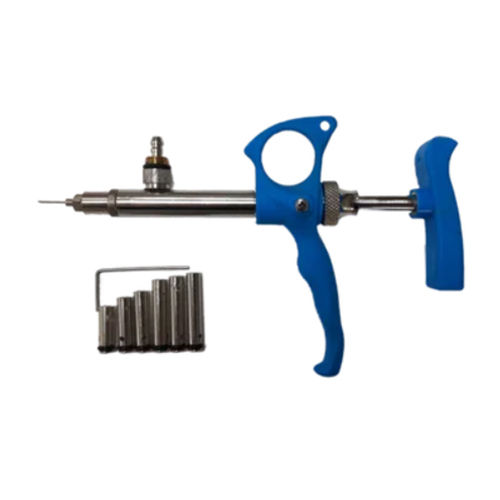
Piston Type Vaccinator
950 INR/Piece
Product Details:
- Type Piston Type Vaccinator
- Material Steel
- Feature Good Quality
- Size Standard
- Technology Manual
- Color Silver
- Click to View more
X
Piston Type Vaccinator Price And Quantity
- 950 INR/Piece
- 100 Piece
Piston Type Vaccinator Product Specifications
- Standard
- Silver
- Steel
- Manual
- Good Quality
- Piston Type Vaccinator
Piston Type Vaccinator Trade Information
- Cash in Advance (CID), Cheque
- 1000 Piece Per Day
- 7 Days
- Asia, Australia, Central America, North America, South America, Eastern Europe, Western Europe, Middle East, Africa
Product Description
A piston-type vaccinator is a device used for administering vaccines to animals, particularly in poultry and livestock. Here are some key features and details:
Features:
- Piston Mechanism: Utilizes a piston to create pressure, allowing for accurate and controlled vaccine delivery.
- Adjustable Dosage: Many models allow you to set the dosage, ensuring each animal receives the appropriate amount of vaccine.
- Easy to Operate: Designed for ease of use, often featuring ergonomic handles for comfortable operation.
- Durable Construction: Made from materials that withstand frequent use in farm environments.
- Interchangeable Needles: Compatible with various needle sizes for different animal types and vaccination needs.
Benefits:
- Efficiency: Increases the speed of vaccination, making it easier to handle large groups of animals.
- Precision: Ensures accurate dosing, which is critical for vaccine efficacy.
- Reduced Stress: Streamlines the vaccination process, minimizing stress for both the animals and the handler.
Use:
- Vaccination Protocols: Commonly used during routine vaccinations to protect against various diseases in poultry and livestock.
If you have specific questions about a piston-type vaccinator or need recommendations, feel free to ask!
Features:
- Piston Mechanism: Utilizes a piston-driven system to draw in and expel vaccine, ensuring accurate dosing with each use.
- Adjustable Dose Settings: Many models allow the operator to adjust the volume of vaccine delivered per shot, making it versatile for different animals and vaccine types.
- Ergonomic Design: Designed for ease of use, often featuring a comfortable grip to reduce fatigue during extended use.
- Durable Construction: Typically made from materials that withstand repeated use and are resistant to chemicals and biological agents.
- Interchangeable Needles: Often compatible with various needle sizes to suit different animals and vaccination sites.
Use:
- Efficient Vaccination: Ideal for mass vaccination in livestock or poultry, reducing the time and labor needed compared to manual injection.
- Precision: Helps ensure accurate dosing, minimizing vaccine waste and ensuring each animal receives the correct amount.
Considerations:
- Maintenance: Regular cleaning and maintenance are crucial to ensure the device functions properly and remains hygienic.
- Training: Proper training for operators is essential to ensure safe and effective use, as well as to minimize stress on the animals.
Tell us about your requirement

Price:
Quantity
Select Unit
- 50
- 100
- 200
- 250
- 500
- 1000+
Additional detail
Mobile number
Email
 English
English Spanish
Spanish French
French German
German Italian
Italian Chinese (Simplified)
Chinese (Simplified) Japanese
Japanese Korean
Korean Arabic
Arabic Portuguese
Portuguese







